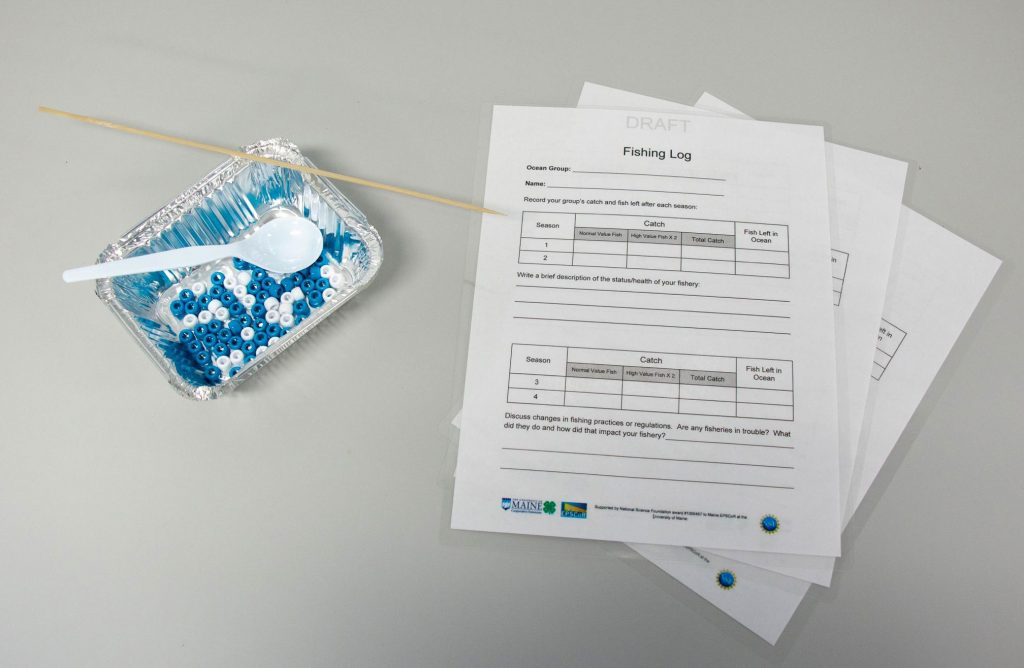Activity 2: Fishing for the Future
Note: This activity is an adaptation of the lesson “Fishing for the Future,” available online (PDF).
We provide the materials for an adaptation of this activity in our 4-H STEM toolkits, substituting two colors of beads to replace the candy specified in the activity. We also substitute skewers for the straws. In our adaptation, youth may only use two fingers to hold the skewers in round one but can use all their fingers on the skewers to represent new technology in later rounds. A full printed version of our adaptation is provided (with the permission of the original authors) for those who borrow our “Innovations in Aquaculture” 4-H Science Toolkit. If you would like to be emailed a copy of this activity please send your request to 4hscience@maine.edu. We regret that we do not have permission to share our version online at this time.
Learning Targets
Participants will:
- Experience the “tragedy of the commons” as it relates to fishing resources.
- Consider social, environmental, and economic impacts of overfishing.
- Identify sustainable fishing practices.
- Understand the importance of aquaculture as it relates to overfishing.
Time to complete activity: 60 minutes
Background for facilitator
Note: All links are provided purely for educational purposes. No responsibility is assumed for any content on the linked site(s).
In this activity, youth will simulate a fishery activity in different oceans. As youth progress through the fishing seasons, they will likely overfish their oceans and will have to migrate to other oceans to meet their basic needs. Most groups will eventually create a total crash of fish stocks in all the oceans. This demonstration will show benefits of sustainable fishing practices and the importance of aquaculture in potentially reducing these problems.
Garrett Hardin coined the phrase “tragedy of the commons” in 1968. Hardin describes cows grazing on a common land. Since there is no direct cost to using the land, individual ranchers are motivated to add to their herds in order to increase their personal wealth. But each added animal damaged the pasture a small, perhaps imperceptible, amount. Ultimately, this gradual degradation destroys the commons. Each rancher acting alone is behaving in an appropriate, rational manner, yet the sum total of all the ranchers’ actions destroys the resource for them all.
From 1950 to 1990, there was a fivefold increase in the world annual fish catch. An increasing demand for fish coupled with environmentally damaging fishing practices are leading to another tragedy of the commons. Roughly 16 percent of the planet’s marine stocks are fully or overly exploited, according to the National Oceanic and Atmospheric Administration (NOAA). It is important for youth and adults to understand the importance of aquaculture as it relates to, and reduces the need for, overfishing.
Vocabulary List
- Sustainability: The ability to continue a defined behavior indefinitely.
- The Tragedy of the Commons: An economic theory of a situation within a shared-resource system where individual users acting independently according to their own self-interest behave contrary to the common good of all users by depleting that resource through their collective action.
Materials
- Small cups, 1 per participant
- Aluminum pan, 1 per group
- Spoons, 1 per group
- Skewer, Wooden, 1 per participant
- Stopwatch
- Handout, fishing log, 1 per participant
- Turquoise Pony Beads, 1 bag of 50 per group
- White Pony Beads, 1 bag of 25 per group
- Fishing Log — one per participant

Additional Resources
- Watch the video The Tragedy of the Commons Explained in One Minute (YouTube) but do not show it to youth until after they’ve participated in the activity.

 This activity is supported by National Science Foundation award #EPS-0904155 to Maine EPSCoR at the University of Maine.
This activity is supported by National Science Foundation award #EPS-0904155 to Maine EPSCoR at the University of Maine.
